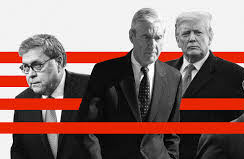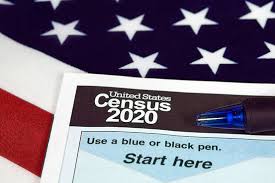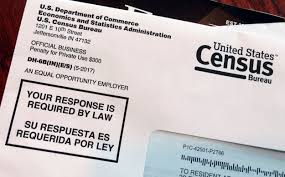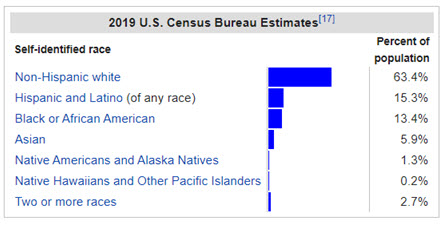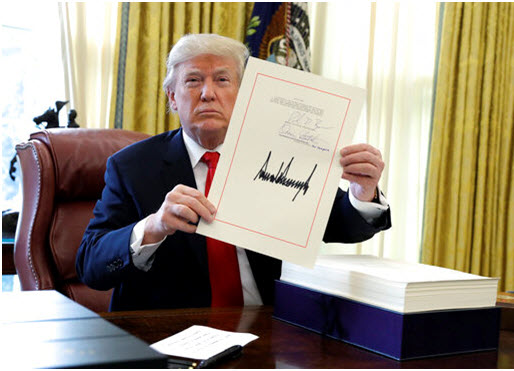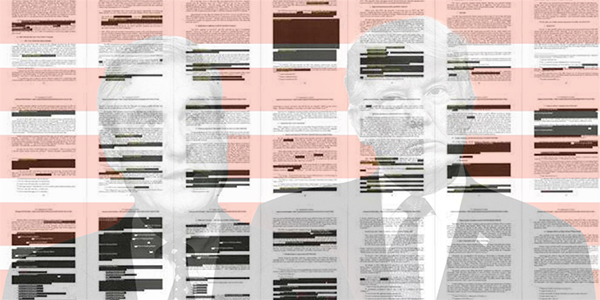Trump Vilified for Desecrating What Reagan Called “the People’s House”
President Donald Trump’s nomination acceptance speech to a crowd of 1,500 on the South Lawn of the White House culminated a week in which a key law that governs the conduct of all government employees was repeatedly ignored and broken. The law — the Hatch Act — prohibits the use of government locations or resources and even mention of job titles when a government employee engages in a political act or speech such as campaigning for a politician or political party. The president has completely trampled the law by using the White House as a prop for his bid for re-election, hosting hundreds of Republican National Convention delegates and Party operatives, with 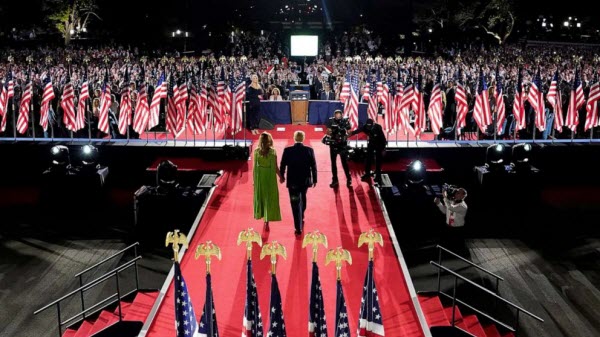
The entrance
campaign banners stretched across the South Lawn, and outsized “Trump Pence” placards making for a double-take that the White House is just another Trump brand building.
The White House needed to be used, according to an official statement, because it is too difficult to move the president during the pandemic. Off he went to a rally in New Hampshire the day after his speech.
Those on the left were incensed. Watching Trump come from inside the White House escorting the First Lady down a long corridor, making an entrance far more grandiose than his escalator descent in Trump Tower five years ago, this time with the people’s house used for backdrop, commentators made remarks such as that by former Missouri Democratic Senator Claire McCaskill saying, “This is what a dictator looks like”.
picking a setting
In yet another instance of laws being for the rest of us, not for the president or other officials in his circle, Secretary of State Mike Pompeo, on an official trip to Israel at government (and our) expense, inserted politics into that mission, recording his convention speech from the roof of the King David hotel so he could have Jerusalem in the background. In an opinion piece in The Washington Post two lawyers, Susan Hennessey and Scott Anderson, formerly with the intelligence services and the State Department wrote, referring to the Hatch Act, “Every U.S. citizen who enters government service agrees to give up some of their rights to engage in politics.” Not Pompeo.
Conservative columnist at thePost, Marc Thiessen, objected to singling out Pompeo, citing Joe Biden “attacking” Trump for knowing nothing of foreign policy when on an official trip to a NATO summit in Riga, Latvia, in August 2016. He cited President Obama for doing much the same on a Japan visit, violating the principle that partisanship should stop at the water’s edge. Trump, though, has not adhered to that at all on his foreign sojourns.
The difference for Pompeo is the State Department. “Diplomats are supposed to represent all Americans to the rest of the world, and limiting their political activities ensures that they are able to serve this role effectively”, say Hennessy and Anderson. “Diplomats, meanwhile, face an added set of restrictions that prohibit them and their families from engaging in any partisan political activity while serving overseas, even in their personal capacities.” No secretary of state has ever participated in a political campaign until Pompeo chose to break with protocol, the professional traditions of the State Department, and the law.
capture the flag
On the third night of the convention, Vice President Pence commandeered Fort McHenry in Maryland, for his talk. Any group can apply to the Parks Department to conduct an event at a national monument but it remains for that group to consider the ethics of its use. Remembering that conventions have always taken place in anonymous arenas, we saw Pence wrap his party in the flag that “was still there”, appropriating the national park where Francis Scott Key wrote what became the lyrics of “The Star-Spangled Banner”, having watched the bombardment of the fort by the British in 1814.
As for the National Parks Service itself, it has been caught out for using federal funds to produce a polished video that praises the president for his involvement in legislation that provides increased funding to parks. And, to satisfy Mr. Trump’s fondness for fireworks to add dramatic fanfare to his appearances (such as at Mount Rushmore for this year’s Fourth of July celebration), the Parks Service staged the fireworks display on the National Mall that followed Mr. Trump’s speech, using government property to advance his political goal. Donald Sherman, deputy director of Citizens for Responsibility and Ethics in Washington told the Washington publication, The Hill:
“Federal appropriations laws make it clear government dollars are meant to be used to serve the American public, not to help political office holders remain in power, and that appears to be what this video and what this event on the Mall is designed to do,”
More than “appears”. The fireworks more than once spelled out “2020” and “TRUMP”.
The Republican National Convention has said it will reimburse the NPS for the costs of the display. Why no pre-payment or down-payment? Why was the permit heavily redacted? Will anyone follow up on that due-bill? Or did we pay for Trump’s fireworks?
firewall
The Hatch Act rules of not combining state and personal business are strict and strictly adhered to on the smallest level, which makes Trump’s major violation all the more authoritarian. Congress members must leave government buildings to make fund-raising phone calls, for example. McCaskill said she…
“…could not make or take a phone call in the Hart Senate office building. Every single member of Congress knows that you do not cross the line between politics and the government’s resources”.
She said that ironically, Mark Meadows, when a member of Congress, “was trying to strengthen the Hatch Act back when he was not this lawless president’s chief of staff”. Television host and commentator Nicolle Wallace, who served as White House Communications Director for President George W. Bush, said, “Richard Painter was my ethics adviser so I couldn’t get a Coke paid for by a reporter”. Chief of Staff Mark Meadows, had on Wednesday said, “Nobody outside of the Beltway really cares” about violations of the Hatch Act. “That to me was an extraordinary window into the lawlessness of the White House staff”, Wallace went on to say. “A White House chief of staff is the one who makes sure all in the staff follow the ethics laws”. Jason Johnson, an associate professor of politics and journalism at Morgan State, was widely reported for saying on a cable talk show, “This was a crime. You can’t have political events from the White House. I watched a criminal act from a criminal president”.
exposure
Trump brought 1,500 delegates, donors, and honorees to the South Lawn in a scene that looked more like his pre-Covid rallies than a nation in the grip of pandemic. 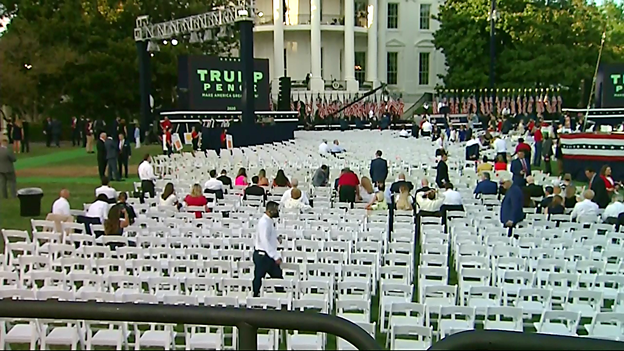
The South Lawn: Packing them in
There they sat for hours, outdoors but with no social distancing, almost none of them wearing masks. It was a superspreader gathering that was a larger assembly than has been seen in New York, a city of over eight million people, since the pandemic took hold in March and probably one of the largest crowds ever allowed on the eighteen White House acres.
An official release from the Trump campaign said the company Patronus Medical would be conducting “strict protocols” that will be “in full compliance with multiple guidelines” but nothing of the sort was in evidence. Meadows said “a number of people” on site would be tested for Covid-19, according to Bloomberg News. The “PBS NewsHour” said they were only those in the first rows who would be proximate to the president. The rest, having come from all over the country, streamed in unchecked and would take home with them whatever they may have contracted from those around them. The Trump administration will likely be uninterested in tracing the guests over the coming weeks so the damage will be hidden. Put at risk, the 1,500 will effectively have been used by the Trump campaign. Mitch McConnell wouldn’t go near the event. Mary Trump, his niece, said after the speech that he doesn’t care about people’s lives.
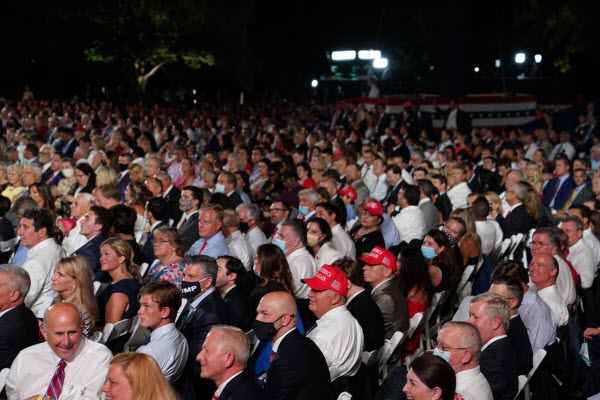
The visuals broadcast across the land of the tightly-spaced and unprotected crowd seemed meant to persuade America that the pandemic is over — this on a day that the number of cases in the United States approached six million, the number of deaths was crossing 180,000, and another 1,100 had just died. The message — forget masks, forget distancing — pandered to that element that is outraged that their Constitutional freedoms should be compromised, never mind such irrelevance in the path of a deadly species.
If a president, and administration officials protected by him, choose to break laws, there isn’t much that can be done to stop them other than wait until the next election, if even that will work. “The fact is we’re here and they’re not”, Trump said, which drew a standing ovation. We have just seen that the impeachment provisions of the Constitution are impotent, with too high a hurdle to surmount (a 2/3rds vote) even if the members of the affected party were to think for themselves and act on their own. Trump saw this week that he and his campaign could break the law in manifold instances, confident that nothing would come of it. You may be for his re-election, but that foretells what is to come if he retains office.

